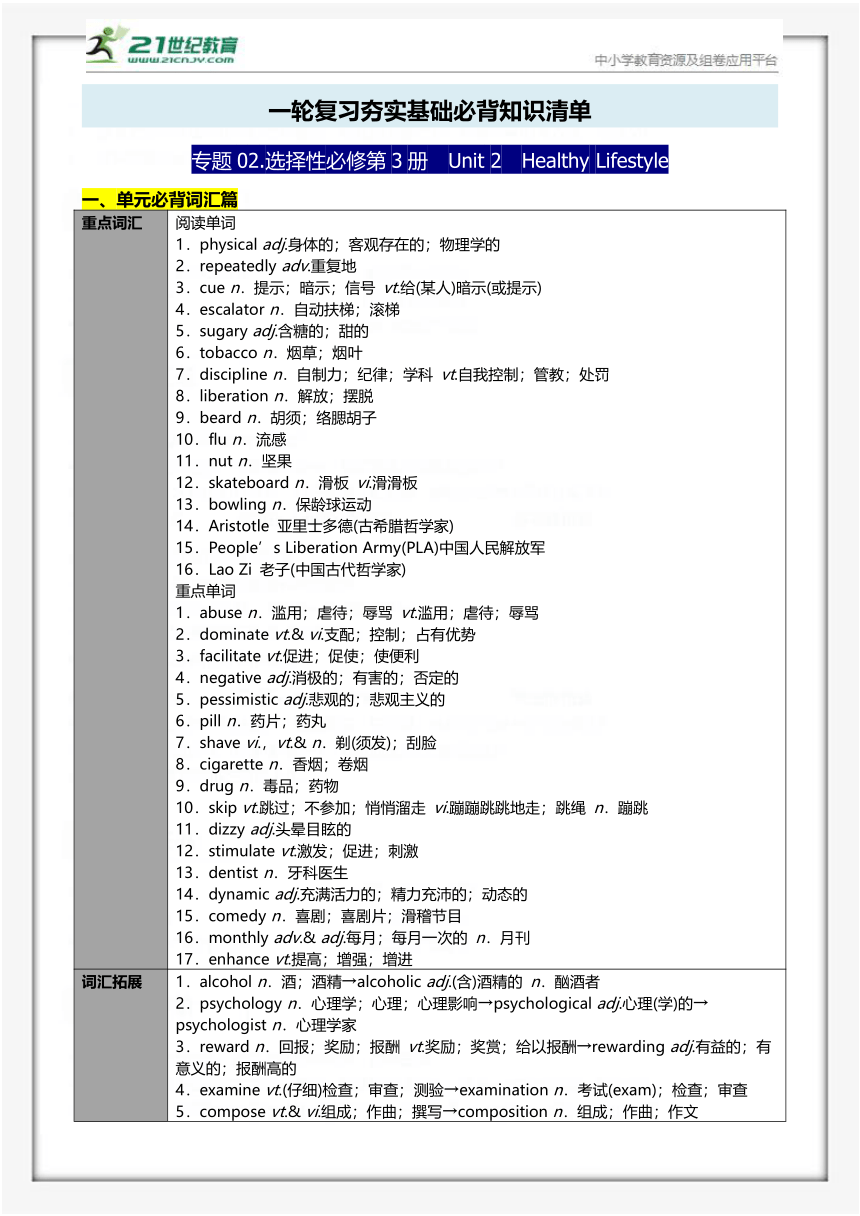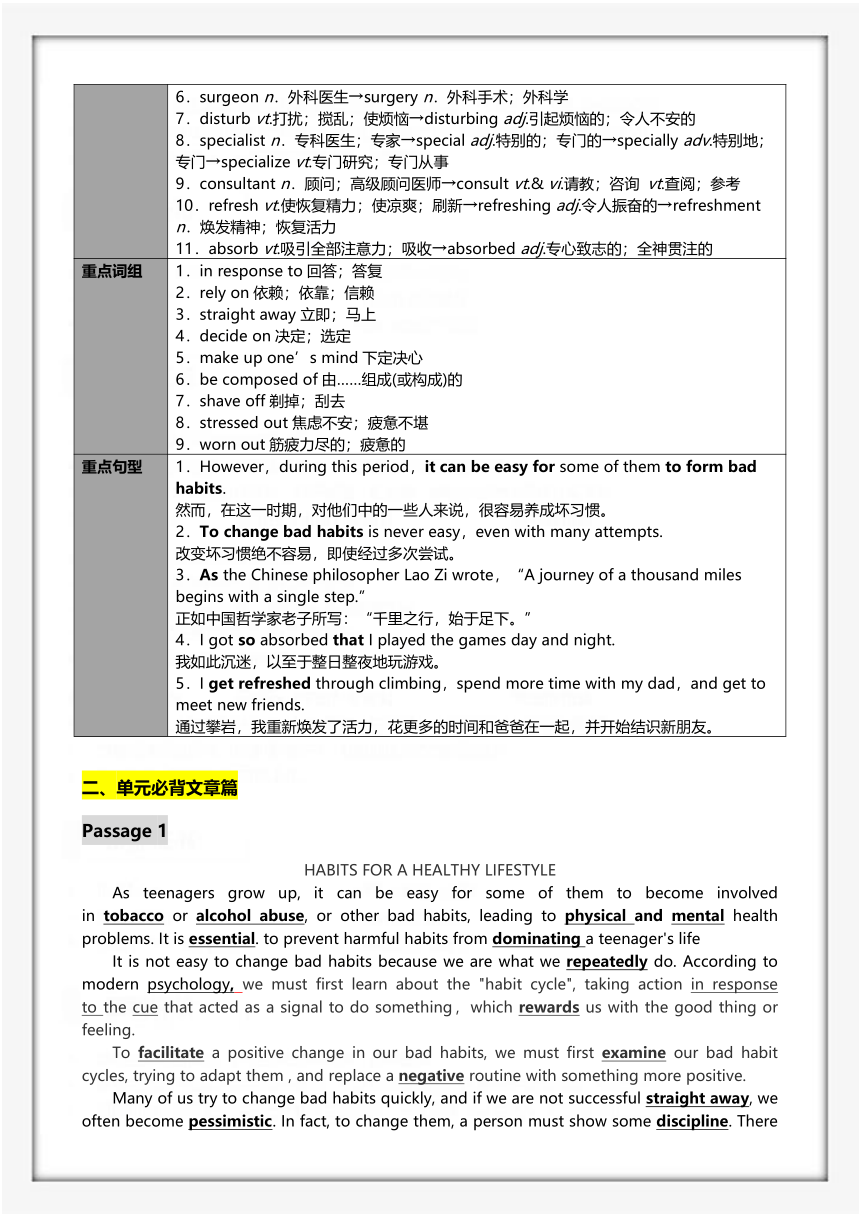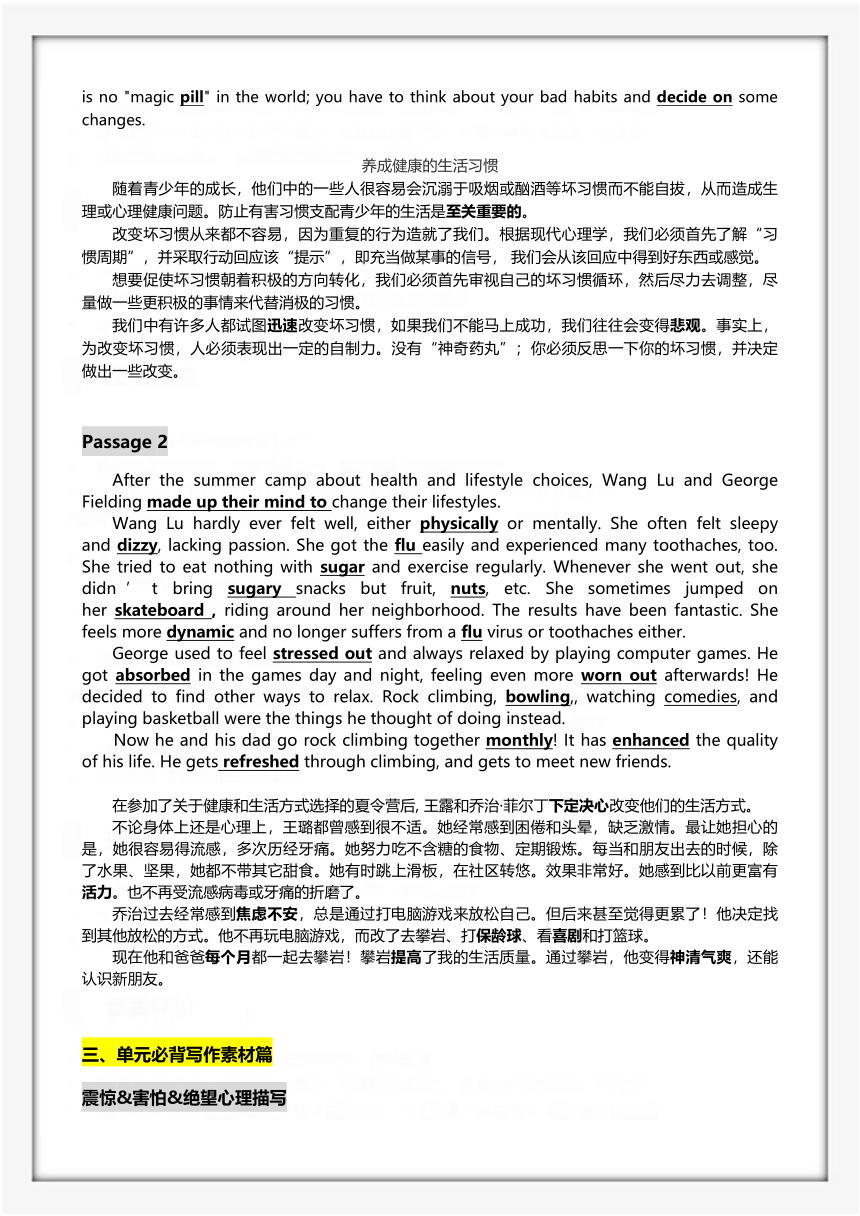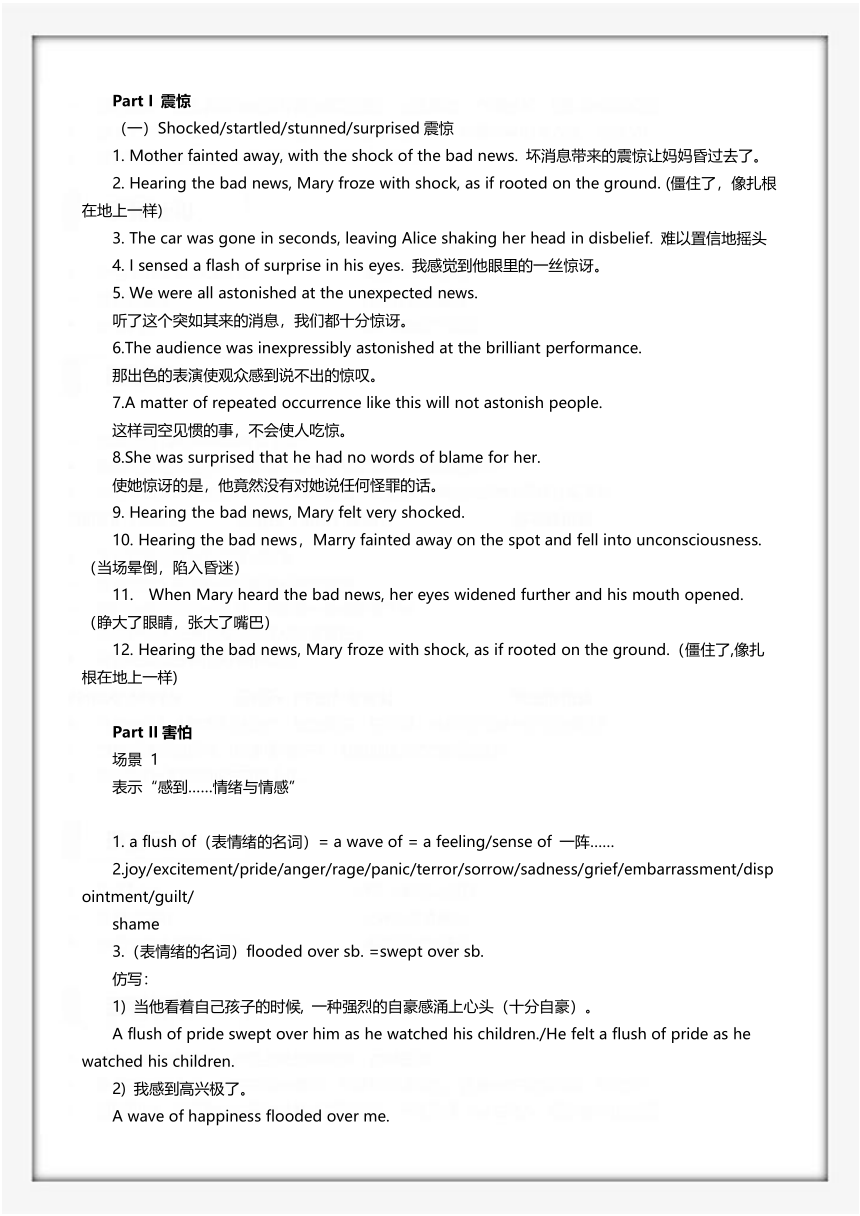(人教版2019)高考英语 一轮复习夯实基础必背知识清单 专题02. 选择性必修第3册 Unit 2 Healthy Lifestyle
文档属性
| 名称 | (人教版2019)高考英语 一轮复习夯实基础必背知识清单 专题02. 选择性必修第3册 Unit 2 Healthy Lifestyle |

|
|
| 格式 | docx | ||
| 文件大小 | 104.4KB | ||
| 资源类型 | 试卷 | ||
| 版本资源 | 人教版(2019) | ||
| 科目 | 英语 | ||
| 更新时间 | 2022-11-18 17:45:42 | ||
图片预览




文档简介
一轮复习夯实基础必背知识清单
专题02.选择性必修第3册 Unit 2 Healthy Lifestyle
一、单元必背词汇篇
重点词汇 阅读单词 1.physical adj.身体的;客观存在的;物理学的 2.repeatedly adv.重复地 3.cue n.提示;暗示;信号 vt.给(某人)暗示(或提示) 4.escalator n.自动扶梯;滚梯 5.sugary adj.含糖的;甜的 6.tobacco n.烟草;烟叶 7.discipline n.自制力;纪律;学科 vt.自我控制;管教;处罚 8.liberation n.解放;摆脱 9.beard n.胡须;络腮胡子 10.flu n.流感 11.nut n.坚果 12.skateboard n.滑板 vi.滑滑板 13.bowling n.保龄球运动 14.Aristotle 亚里士多德(古希腊哲学家) 15.People’s Liberation Army(PLA)中国人民解放军 16.Lao Zi 老子(中国古代哲学家) 重点单词 1.abuse n.滥用;虐待;辱骂 vt.滥用;虐待;辱骂 2.dominate vt.& vi.支配;控制;占有优势 3.facilitate vt.促进;促使;使便利 4.negative adj.消极的;有害的;否定的 5.pessimistic adj.悲观的;悲观主义的 6.pill n.药片;药丸 7.shave vi.,vt.& n.剃(须发);刮脸 8.cigarette n.香烟;卷烟 9.drug n.毒品;药物 10.skip vt.跳过;不参加;悄悄溜走 vi.蹦蹦跳跳地走;跳绳 n.蹦跳 11.dizzy adj.头晕目眩的 12.stimulate vt.激发;促进;刺激 13.dentist n.牙科医生 14.dynamic adj.充满活力的;精力充沛的;动态的 15.comedy n.喜剧;喜剧片;滑稽节目 16.monthly adv.& adj.每月;每月一次的 n.月刊 17.enhance vt.提高;增强;增进
词汇拓展 1.alcohol n.酒;酒精→alcoholic adj.(含)酒精的 n.酗酒者 2.psychology n.心理学;心理;心理影响→psychological adj.心理(学)的→psychologist n.心理学家 3.reward n.回报;奖励;报酬 vt.奖励;奖赏;给以报酬→rewarding adj.有益的;有意义的;报酬高的 4.examine vt.(仔细)检查;审查;测验→examination n.考试(exam);检查;审查 5.compose vt.& vi.组成;作曲;撰写→composition n.组成;作曲;作文 6.surgeon n.外科医生→surgery n.外科手术;外科学 7.disturb vt.打扰;搅乱;使烦恼→disturbing adj.引起烦恼的;令人不安的 8.specialist n.专科医生;专家→special adj.特别的;专门的→specially adv.特别地;专门→specialize vt.专门研究;专门从事 9.consultant n.顾问;高级顾问医师→consult vt.& vi.请教;咨询 vt.查阅;参考 10.refresh vt.使恢复精力;使凉爽;刷新→refreshing adj.令人振奋的→refreshment n.焕发精神;恢复活力 11.absorb vt.吸引全部注意力;吸收→absorbed adj.专心致志的;全神贯注的
重点词组 1.in response to回答;答复 2.rely on依赖;依靠;信赖 3.straight away立即;马上 4.decide on决定;选定 5.make up one’s mind下定决心 6.be composed of由……组成(或构成)的 7.shave off剃掉;刮去 8.stressed out焦虑不安;疲惫不堪 9.worn out筋疲力尽的;疲惫的
重点句型 1.However,during this period,it can be easy for some of them to form bad habits. 然而,在这一时期,对他们中的一些人来说,很容易养成坏习惯。 2.To change bad habits is never easy,even with many attempts. 改变坏习惯绝不容易,即使经过多次尝试。 3.As the Chinese philosopher Lao Zi wrote,“A journey of a thousand miles begins with a single step.” 正如中国哲学家老子所写:“千里之行,始于足下。” 4.I got so absorbed that I played the games day and night. 我如此沉迷,以至于整日整夜地玩游戏。 5.I get refreshed through climbing,spend more time with my dad,and get to meet new friends. 通过攀岩,我重新焕发了活力,花更多的时间和爸爸在一起,并开始结识新朋友。
单元必背文章篇
Passage 1
HABITS FOR A HEALTHY LIFESTYLE
As teenagers grow up, it can be easy for some of them to become involved in tobacco or alcohol abuse, or other bad habits, leading to physical and mental health problems. It is essential. to prevent harmful habits from dominating a teenager's life
It is not easy to change bad habits because we are what we repeatedly do. According to modern psychology, we must first learn about the "habit cycle", taking action in response to the cue that acted as a signal to do something,which rewards us with the good thing or feeling.
To facilitate a positive change in our bad habits, we must first examine our bad habit cycles, trying to adapt them , and replace a negative routine with something more positive.
Many of us try to change bad habits quickly, and if we are not successful straight away, we often become pessimistic. In fact, to change them, a person must show some discipline. There is no "magic pill" in the world; you have to think about your bad habits and decide on some changes.
养成健康的生活习惯
随着青少年的成长,他们中的一些人很容易会沉溺于吸烟或酗酒等坏习惯而不能自拔,从而造成生理或心理健康问题。防止有害习惯支配青少年的生活是至关重要的。
改变坏习惯从来都不容易,因为重复的行为造就了我们。根据现代心理学,我们必须首先了解“习惯周期”,并采取行动回应该“提示”,即充当做某事的信号, 我们会从该回应中得到好东西或感觉。
想要促使坏习惯朝着积极的方向转化,我们必须首先审视自己的坏习惯循环,然后尽力去调整,尽量做一些更积极的事情来代替消极的习惯。
我们中有许多人都试图迅速改变坏习惯,如果我们不能马上成功,我们往往会变得悲观。事实上,为改变坏习惯,人必须表现出一定的自制力。没有“神奇药丸”;你必须反思一下你的坏习惯,并决定做出一些改变。
Passage 2
After the summer camp about health and lifestyle choices, Wang Lu and George Fielding made up their mind to change their lifestyles.
Wang Lu hardly ever felt well, either physically or mentally. She often felt sleepy and dizzy, lacking passion. She got the flu easily and experienced many toothaches, too. She tried to eat nothing with sugar and exercise regularly. Whenever she went out, she didn’t bring sugary snacks but fruit, nuts, etc. She sometimes jumped on her skateboard , riding around her neighborhood. The results have been fantastic. She feels more dynamic and no longer suffers from a flu virus or toothaches either.
George used to feel stressed out and always relaxed by playing computer games. He got absorbed in the games day and night, feeling even more worn out afterwards! He decided to find other ways to relax. Rock climbing, bowling,, watching comedies, and playing basketball were the things he thought of doing instead.
Now he and his dad go rock climbing together monthly! It has enhanced the quality of his life. He gets refreshed through climbing, and gets to meet new friends.
在参加了关于健康和生活方式选择的夏令营后, 王露和乔治·菲尔丁下定决心改变他们的生活方式。
不论身体上还是心理上,王璐都曾感到很不适。她经常感到困倦和头晕,缺乏激情。最让她担心的是,她很容易得流感,多次历经牙痛。她努力吃不含糖的食物、定期锻炼。每当和朋友出去的时候,除了水果、坚果,她都不带其它甜食。她有时跳上滑板,在社区转悠。效果非常好。她感到比以前更富有活力。也不再受流感病毒或牙痛的折磨了。
乔治过去经常感到焦虑不安,总是通过打电脑游戏来放松自己。但后来甚至觉得更累了!他决定找到其他放松的方式。他不再玩电脑游戏,而改了去攀岩、打保龄球、看喜剧和打篮球。
现在他和爸爸每个月都一起去攀岩!攀岩提高了我的生活质量。通过攀岩,他变得神清气爽,还能认识新朋友。
三、单元必背写作素材篇
震惊&害怕&绝望心理描写
Part I 震惊
(一)Shocked/startled/stunned/surprised震惊
1. Mother fainted away, with the shock of the bad news. 坏消息带来的震惊让妈妈昏过去了。
2. Hearing the bad news, Mary froze with shock, as if rooted on the ground. (僵住了,像扎根在地上一样)
3. The car was gone in seconds, leaving Alice shaking her head in disbelief. 难以置信地摇头
4. I sensed a flash of surprise in his eyes. 我感觉到他眼里的一丝惊讶。
5. We were all astonished at the unexpected news.
听了这个突如其来的消息,我们都十分惊讶。
6.The audience was inexpressibly astonished at the brilliant performance.
那出色的表演使观众感到说不出的惊叹。
7.A matter of repeated occurrence like this will not astonish people.
这样司空见惯的事,不会使人吃惊。
8.She was surprised that he had no words of blame for her.
使她惊讶的是,他竟然没有对她说任何怪罪的话。
9. Hearing the bad news, Mary felt very shocked.
10. Hearing the bad news,Marry fainted away on the spot and fell into unconsciousness. (当场晕倒,陷入昏迷)
11. When Mary heard the bad news, her eyes widened further and his mouth opened. (睁大了眼睛,张大了嘴巴)
12. Hearing the bad news, Mary froze with shock, as if rooted on the ground.(僵住了,像扎根在地上一样)
Part II害怕
场景 1
表示“感到……情绪与情感”
1. a flush of(表情绪的名词)= a wave of = a feeling/sense of 一阵……
2.joy/excitement/pride/anger/rage/panic/terror/sorrow/sadness/grief/embarrassment/dispointment/guilt/
shame
3.(表情绪的名词)flooded over sb. =swept over sb.
仿写:
1) 当他看着自己孩子的时候, 一种强烈的自豪感涌上心头(十分自豪)。
A flush of pride swept over him as he watched his children./He felt a flush of pride as he watched his children.
2) 我感到高兴极了。
A wave of happiness flooded over me.
3) 他感到非常恐慌。
A flush of panic spread across his face/cheeks./A flush of fear flooded/swept over him.
场景 2
表示“(因为紧张、害怕)心跳”
1. sb. could feel one’s heart pounding wildly in one’s chest.
(pounding/beating/racing)(wildly/loudly/hard) 感到心在胸中砰砰直跳
仿写:
1) 上台领奖时我感到心砰砰直跳。
I could feel my heart pounding as I went on stage to collect the prize.
2) 我的心开始咚咚跳,嘴里发干。
My heart started to beat, and my mouth was dry.
3) 他打开信,心在咚咚跳着。
He unfolded the letter, his heart racing
表示“因……颤抖”
tremble/shiver/shake (with fear, panic excitement, rage...)
仿写:
1) 她双唇颤抖着,泪珠顺着面颊滚落下来。
Her lips shivered and big tears rolled down her cheeks.
2) 他握紧拳头,气得发抖。
He clenched his fists, trembling with rage.
3) 他躺在那里很长时间,害怕得发抖。
He lay there for a long time, shivering with fear.
表示“流泪”
1. Tears blurred one’s eyes./One’s eyes got misty./One’s eyes misted/dimmed with tears. 泪眼模糊
2. ...be close to tears 几乎要哭了
3. tears (roll down one’s eyes/cheeks/face) 泪水落下
仿写:
1) 当得知我被重点大学录取时,我妈差点儿就哭了。
My mother was close to tears when she heard I was admitted to a key university.
2)他站在一个角落里,泪流满面。
He stood in a corner with tears rolling down his face.
Part II绝望
1.词汇和短语
①desperate a. 绝望的,不顾一切的
②desperation n. 绝望
③a desperate bid for freedom孤注一掷争取自由的努力
④hopeless a. 绝望的
⑤despair n./vi. 绝望
⑥despairing令人绝望的
⑦self-despair n. 对自己感到绝望
⑧despair of 对…感到绝望
⑨in despair 绝望地
⑩be the despair of sb.令某人感到绝望
feeling of despair 绝望情绪,绝望情绪
fall into the abyss of despair 陷入绝望的深渊
the despair of my life 使我感到毫无办法的人[事]
be filled with despair 满心绝望,深感绝望
drive sb to despair 使某人陷入绝望
in the depth of despair 在极度的绝望中
fall into despair 陷入绝望
2.句子
①She flagged her yellow blouse in a desperate attempt to save herself.
为了活命,她拼命挥舞着黄衬衫。
②I'm desperate for a cigarette.我很想抽支烟。
③His increasing financial difficulties forced him to take desperate measures.
不断增加的经济困难迫使他采取了铤而走险的办法。
④Doctors were fighting a desperate battle to save the little girl's life.
医生们不惜一切地奋力抢救小女孩的生命。
⑤He was so desperate for a job he would have done anything.
他当时太想找份工作了,什么事都愿意干。
⑥I was absolutely desperate to see her.我极想见到她。
⑦My heart broke. 我的心都碎了。
⑧I felt heart broken.我的心碎了。
⑨My heart has been filled with grief.我的心充满悲伤。
⑩The sad story depressed me. 那悲惨的故事使我心情抑郁。
The sad story really brought me down.那悲惨的故事真的使我灰心丧气。
It was fate.这就是命运呀!
It was meant to be.上天注定如此。
It's my destiny.这就是我的宿命。
He sighed with despair.他绝望地叹了口气。
I am in desperate need of help. 我迫切地需要帮助。
My wife and I were in utter despair.我和我的妻子完全绝望了。
四、单元必背语法篇
Grammar 不定式作主语
【观察例句】
1.To say is one thing and to do is another.
2.It's rude to turn your back to your teacher and refuse to answer.
3.It is impossible to learn a foreign language without making painstaking effort.
4.It seemed a pity to have wasted so much time.
【归纳用法】
1.把不定式置于句首。如:
To get there by bike will take us half an hour.
骑自行车到那儿将花费我们半个小时。
To make a plan first is a good idea.
首先制定好计划是个好主意。
2.用it作形式主语,把真正的主语不定式置于句后,常用于下列句式中。如:
(1)It+be+名词+to do
It's our duty to take good care of the old.
照顾好老人是我们的责任。
(2)It takes sb.+some time+to do
How long did it take you to finish the work
你花了多少时间来完成这项工作?
(3)It+be+形容词+for sb.+to do
It is difficult for us to finish writing the composition in a quarter of an hour.
我们难以在15分钟内完成这篇作文。
(4)It seems(appears)+形容词+to do
It seemed impossible to save money.
省钱似乎不可能。
(5)It + 不定式结构可位于believe/consider/discover/expect/
find/think和wonder之后
He thought it would be safer to go by train.
他认为乘火车比较安全。
(6)不定式的完成式也可作句子的主语
To have made the same mistake twice was unforgivable.
犯同样的错误两次是不可原谅的。
It is better to have loved and lost than never to have loved at all.
爱过之后失去了爱,比从未爱过要好。
[即学即练1] 单句语法填空
① (make) up for lost time is not possible.
②It is good for your study (discuss) with your classmates.
【答案】1.To make2.to discuss
3.不定式和动名词作主语的区别
(1)动名词作主语通常表示抽象动作;而不定式作主语表示具体动作。
Smoking is prohibited here.
这里禁止抽烟。(抽象)
It is not very good for you to smoke so much.
你抽这么多烟对你身体很不好。(具体)
(2)动名词作主语时,通常用以表示一件已知的事或经验;不定式短语通常用来表示一件未完成的事或目的。
Climbing mountains is interesting.
爬山很有趣。(经验)
To finish the task will take a long time.
要完成这项任务将要花费很长时间。(具体)
[即学即练2] 单句语法填空
① (watch) news on TV has become a routine for me.
②It took me only five minutes (finish) the job.
【答案】1.Watching2.to finish
Ⅰ.单句语法填空
1. (lean) out of the window is dangerous.
2. (save) money now seems impossible.
3.It is an offence (drop) litter in the street.
4.It is stupid of you (write) down everything (that) the teacher says.
5. (drive) a car during the rush hour is tiring.
【答案】1.To lean2..To save3.to drop4.Driving
专题02.选择性必修第3册 Unit 2 Healthy Lifestyle
一、单元必背词汇篇
重点词汇 阅读单词 1.physical adj.身体的;客观存在的;物理学的 2.repeatedly adv.重复地 3.cue n.提示;暗示;信号 vt.给(某人)暗示(或提示) 4.escalator n.自动扶梯;滚梯 5.sugary adj.含糖的;甜的 6.tobacco n.烟草;烟叶 7.discipline n.自制力;纪律;学科 vt.自我控制;管教;处罚 8.liberation n.解放;摆脱 9.beard n.胡须;络腮胡子 10.flu n.流感 11.nut n.坚果 12.skateboard n.滑板 vi.滑滑板 13.bowling n.保龄球运动 14.Aristotle 亚里士多德(古希腊哲学家) 15.People’s Liberation Army(PLA)中国人民解放军 16.Lao Zi 老子(中国古代哲学家) 重点单词 1.abuse n.滥用;虐待;辱骂 vt.滥用;虐待;辱骂 2.dominate vt.& vi.支配;控制;占有优势 3.facilitate vt.促进;促使;使便利 4.negative adj.消极的;有害的;否定的 5.pessimistic adj.悲观的;悲观主义的 6.pill n.药片;药丸 7.shave vi.,vt.& n.剃(须发);刮脸 8.cigarette n.香烟;卷烟 9.drug n.毒品;药物 10.skip vt.跳过;不参加;悄悄溜走 vi.蹦蹦跳跳地走;跳绳 n.蹦跳 11.dizzy adj.头晕目眩的 12.stimulate vt.激发;促进;刺激 13.dentist n.牙科医生 14.dynamic adj.充满活力的;精力充沛的;动态的 15.comedy n.喜剧;喜剧片;滑稽节目 16.monthly adv.& adj.每月;每月一次的 n.月刊 17.enhance vt.提高;增强;增进
词汇拓展 1.alcohol n.酒;酒精→alcoholic adj.(含)酒精的 n.酗酒者 2.psychology n.心理学;心理;心理影响→psychological adj.心理(学)的→psychologist n.心理学家 3.reward n.回报;奖励;报酬 vt.奖励;奖赏;给以报酬→rewarding adj.有益的;有意义的;报酬高的 4.examine vt.(仔细)检查;审查;测验→examination n.考试(exam);检查;审查 5.compose vt.& vi.组成;作曲;撰写→composition n.组成;作曲;作文 6.surgeon n.外科医生→surgery n.外科手术;外科学 7.disturb vt.打扰;搅乱;使烦恼→disturbing adj.引起烦恼的;令人不安的 8.specialist n.专科医生;专家→special adj.特别的;专门的→specially adv.特别地;专门→specialize vt.专门研究;专门从事 9.consultant n.顾问;高级顾问医师→consult vt.& vi.请教;咨询 vt.查阅;参考 10.refresh vt.使恢复精力;使凉爽;刷新→refreshing adj.令人振奋的→refreshment n.焕发精神;恢复活力 11.absorb vt.吸引全部注意力;吸收→absorbed adj.专心致志的;全神贯注的
重点词组 1.in response to回答;答复 2.rely on依赖;依靠;信赖 3.straight away立即;马上 4.decide on决定;选定 5.make up one’s mind下定决心 6.be composed of由……组成(或构成)的 7.shave off剃掉;刮去 8.stressed out焦虑不安;疲惫不堪 9.worn out筋疲力尽的;疲惫的
重点句型 1.However,during this period,it can be easy for some of them to form bad habits. 然而,在这一时期,对他们中的一些人来说,很容易养成坏习惯。 2.To change bad habits is never easy,even with many attempts. 改变坏习惯绝不容易,即使经过多次尝试。 3.As the Chinese philosopher Lao Zi wrote,“A journey of a thousand miles begins with a single step.” 正如中国哲学家老子所写:“千里之行,始于足下。” 4.I got so absorbed that I played the games day and night. 我如此沉迷,以至于整日整夜地玩游戏。 5.I get refreshed through climbing,spend more time with my dad,and get to meet new friends. 通过攀岩,我重新焕发了活力,花更多的时间和爸爸在一起,并开始结识新朋友。
单元必背文章篇
Passage 1
HABITS FOR A HEALTHY LIFESTYLE
As teenagers grow up, it can be easy for some of them to become involved in tobacco or alcohol abuse, or other bad habits, leading to physical and mental health problems. It is essential. to prevent harmful habits from dominating a teenager's life
It is not easy to change bad habits because we are what we repeatedly do. According to modern psychology, we must first learn about the "habit cycle", taking action in response to the cue that acted as a signal to do something,which rewards us with the good thing or feeling.
To facilitate a positive change in our bad habits, we must first examine our bad habit cycles, trying to adapt them , and replace a negative routine with something more positive.
Many of us try to change bad habits quickly, and if we are not successful straight away, we often become pessimistic. In fact, to change them, a person must show some discipline. There is no "magic pill" in the world; you have to think about your bad habits and decide on some changes.
养成健康的生活习惯
随着青少年的成长,他们中的一些人很容易会沉溺于吸烟或酗酒等坏习惯而不能自拔,从而造成生理或心理健康问题。防止有害习惯支配青少年的生活是至关重要的。
改变坏习惯从来都不容易,因为重复的行为造就了我们。根据现代心理学,我们必须首先了解“习惯周期”,并采取行动回应该“提示”,即充当做某事的信号, 我们会从该回应中得到好东西或感觉。
想要促使坏习惯朝着积极的方向转化,我们必须首先审视自己的坏习惯循环,然后尽力去调整,尽量做一些更积极的事情来代替消极的习惯。
我们中有许多人都试图迅速改变坏习惯,如果我们不能马上成功,我们往往会变得悲观。事实上,为改变坏习惯,人必须表现出一定的自制力。没有“神奇药丸”;你必须反思一下你的坏习惯,并决定做出一些改变。
Passage 2
After the summer camp about health and lifestyle choices, Wang Lu and George Fielding made up their mind to change their lifestyles.
Wang Lu hardly ever felt well, either physically or mentally. She often felt sleepy and dizzy, lacking passion. She got the flu easily and experienced many toothaches, too. She tried to eat nothing with sugar and exercise regularly. Whenever she went out, she didn’t bring sugary snacks but fruit, nuts, etc. She sometimes jumped on her skateboard , riding around her neighborhood. The results have been fantastic. She feels more dynamic and no longer suffers from a flu virus or toothaches either.
George used to feel stressed out and always relaxed by playing computer games. He got absorbed in the games day and night, feeling even more worn out afterwards! He decided to find other ways to relax. Rock climbing, bowling,, watching comedies, and playing basketball were the things he thought of doing instead.
Now he and his dad go rock climbing together monthly! It has enhanced the quality of his life. He gets refreshed through climbing, and gets to meet new friends.
在参加了关于健康和生活方式选择的夏令营后, 王露和乔治·菲尔丁下定决心改变他们的生活方式。
不论身体上还是心理上,王璐都曾感到很不适。她经常感到困倦和头晕,缺乏激情。最让她担心的是,她很容易得流感,多次历经牙痛。她努力吃不含糖的食物、定期锻炼。每当和朋友出去的时候,除了水果、坚果,她都不带其它甜食。她有时跳上滑板,在社区转悠。效果非常好。她感到比以前更富有活力。也不再受流感病毒或牙痛的折磨了。
乔治过去经常感到焦虑不安,总是通过打电脑游戏来放松自己。但后来甚至觉得更累了!他决定找到其他放松的方式。他不再玩电脑游戏,而改了去攀岩、打保龄球、看喜剧和打篮球。
现在他和爸爸每个月都一起去攀岩!攀岩提高了我的生活质量。通过攀岩,他变得神清气爽,还能认识新朋友。
三、单元必背写作素材篇
震惊&害怕&绝望心理描写
Part I 震惊
(一)Shocked/startled/stunned/surprised震惊
1. Mother fainted away, with the shock of the bad news. 坏消息带来的震惊让妈妈昏过去了。
2. Hearing the bad news, Mary froze with shock, as if rooted on the ground. (僵住了,像扎根在地上一样)
3. The car was gone in seconds, leaving Alice shaking her head in disbelief. 难以置信地摇头
4. I sensed a flash of surprise in his eyes. 我感觉到他眼里的一丝惊讶。
5. We were all astonished at the unexpected news.
听了这个突如其来的消息,我们都十分惊讶。
6.The audience was inexpressibly astonished at the brilliant performance.
那出色的表演使观众感到说不出的惊叹。
7.A matter of repeated occurrence like this will not astonish people.
这样司空见惯的事,不会使人吃惊。
8.She was surprised that he had no words of blame for her.
使她惊讶的是,他竟然没有对她说任何怪罪的话。
9. Hearing the bad news, Mary felt very shocked.
10. Hearing the bad news,Marry fainted away on the spot and fell into unconsciousness. (当场晕倒,陷入昏迷)
11. When Mary heard the bad news, her eyes widened further and his mouth opened. (睁大了眼睛,张大了嘴巴)
12. Hearing the bad news, Mary froze with shock, as if rooted on the ground.(僵住了,像扎根在地上一样)
Part II害怕
场景 1
表示“感到……情绪与情感”
1. a flush of(表情绪的名词)= a wave of = a feeling/sense of 一阵……
2.joy/excitement/pride/anger/rage/panic/terror/sorrow/sadness/grief/embarrassment/dispointment/guilt/
shame
3.(表情绪的名词)flooded over sb. =swept over sb.
仿写:
1) 当他看着自己孩子的时候, 一种强烈的自豪感涌上心头(十分自豪)。
A flush of pride swept over him as he watched his children./He felt a flush of pride as he watched his children.
2) 我感到高兴极了。
A wave of happiness flooded over me.
3) 他感到非常恐慌。
A flush of panic spread across his face/cheeks./A flush of fear flooded/swept over him.
场景 2
表示“(因为紧张、害怕)心跳”
1. sb. could feel one’s heart pounding wildly in one’s chest.
(pounding/beating/racing)(wildly/loudly/hard) 感到心在胸中砰砰直跳
仿写:
1) 上台领奖时我感到心砰砰直跳。
I could feel my heart pounding as I went on stage to collect the prize.
2) 我的心开始咚咚跳,嘴里发干。
My heart started to beat, and my mouth was dry.
3) 他打开信,心在咚咚跳着。
He unfolded the letter, his heart racing
表示“因……颤抖”
tremble/shiver/shake (with fear, panic excitement, rage...)
仿写:
1) 她双唇颤抖着,泪珠顺着面颊滚落下来。
Her lips shivered and big tears rolled down her cheeks.
2) 他握紧拳头,气得发抖。
He clenched his fists, trembling with rage.
3) 他躺在那里很长时间,害怕得发抖。
He lay there for a long time, shivering with fear.
表示“流泪”
1. Tears blurred one’s eyes./One’s eyes got misty./One’s eyes misted/dimmed with tears. 泪眼模糊
2. ...be close to tears 几乎要哭了
3. tears (roll down one’s eyes/cheeks/face) 泪水落下
仿写:
1) 当得知我被重点大学录取时,我妈差点儿就哭了。
My mother was close to tears when she heard I was admitted to a key university.
2)他站在一个角落里,泪流满面。
He stood in a corner with tears rolling down his face.
Part II绝望
1.词汇和短语
①desperate a. 绝望的,不顾一切的
②desperation n. 绝望
③a desperate bid for freedom孤注一掷争取自由的努力
④hopeless a. 绝望的
⑤despair n./vi. 绝望
⑥despairing令人绝望的
⑦self-despair n. 对自己感到绝望
⑧despair of 对…感到绝望
⑨in despair 绝望地
⑩be the despair of sb.令某人感到绝望
feeling of despair 绝望情绪,绝望情绪
fall into the abyss of despair 陷入绝望的深渊
the despair of my life 使我感到毫无办法的人[事]
be filled with despair 满心绝望,深感绝望
drive sb to despair 使某人陷入绝望
in the depth of despair 在极度的绝望中
fall into despair 陷入绝望
2.句子
①She flagged her yellow blouse in a desperate attempt to save herself.
为了活命,她拼命挥舞着黄衬衫。
②I'm desperate for a cigarette.我很想抽支烟。
③His increasing financial difficulties forced him to take desperate measures.
不断增加的经济困难迫使他采取了铤而走险的办法。
④Doctors were fighting a desperate battle to save the little girl's life.
医生们不惜一切地奋力抢救小女孩的生命。
⑤He was so desperate for a job he would have done anything.
他当时太想找份工作了,什么事都愿意干。
⑥I was absolutely desperate to see her.我极想见到她。
⑦My heart broke. 我的心都碎了。
⑧I felt heart broken.我的心碎了。
⑨My heart has been filled with grief.我的心充满悲伤。
⑩The sad story depressed me. 那悲惨的故事使我心情抑郁。
The sad story really brought me down.那悲惨的故事真的使我灰心丧气。
It was fate.这就是命运呀!
It was meant to be.上天注定如此。
It's my destiny.这就是我的宿命。
He sighed with despair.他绝望地叹了口气。
I am in desperate need of help. 我迫切地需要帮助。
My wife and I were in utter despair.我和我的妻子完全绝望了。
四、单元必背语法篇
Grammar 不定式作主语
【观察例句】
1.To say is one thing and to do is another.
2.It's rude to turn your back to your teacher and refuse to answer.
3.It is impossible to learn a foreign language without making painstaking effort.
4.It seemed a pity to have wasted so much time.
【归纳用法】
1.把不定式置于句首。如:
To get there by bike will take us half an hour.
骑自行车到那儿将花费我们半个小时。
To make a plan first is a good idea.
首先制定好计划是个好主意。
2.用it作形式主语,把真正的主语不定式置于句后,常用于下列句式中。如:
(1)It+be+名词+to do
It's our duty to take good care of the old.
照顾好老人是我们的责任。
(2)It takes sb.+some time+to do
How long did it take you to finish the work
你花了多少时间来完成这项工作?
(3)It+be+形容词+for sb.+to do
It is difficult for us to finish writing the composition in a quarter of an hour.
我们难以在15分钟内完成这篇作文。
(4)It seems(appears)+形容词+to do
It seemed impossible to save money.
省钱似乎不可能。
(5)It + 不定式结构可位于believe/consider/discover/expect/
find/think和wonder之后
He thought it would be safer to go by train.
他认为乘火车比较安全。
(6)不定式的完成式也可作句子的主语
To have made the same mistake twice was unforgivable.
犯同样的错误两次是不可原谅的。
It is better to have loved and lost than never to have loved at all.
爱过之后失去了爱,比从未爱过要好。
[即学即练1] 单句语法填空
① (make) up for lost time is not possible.
②It is good for your study (discuss) with your classmates.
【答案】1.To make2.to discuss
3.不定式和动名词作主语的区别
(1)动名词作主语通常表示抽象动作;而不定式作主语表示具体动作。
Smoking is prohibited here.
这里禁止抽烟。(抽象)
It is not very good for you to smoke so much.
你抽这么多烟对你身体很不好。(具体)
(2)动名词作主语时,通常用以表示一件已知的事或经验;不定式短语通常用来表示一件未完成的事或目的。
Climbing mountains is interesting.
爬山很有趣。(经验)
To finish the task will take a long time.
要完成这项任务将要花费很长时间。(具体)
[即学即练2] 单句语法填空
① (watch) news on TV has become a routine for me.
②It took me only five minutes (finish) the job.
【答案】1.Watching2.to finish
Ⅰ.单句语法填空
1. (lean) out of the window is dangerous.
2. (save) money now seems impossible.
3.It is an offence (drop) litter in the street.
4.It is stupid of you (write) down everything (that) the teacher says.
5. (drive) a car during the rush hour is tiring.
【答案】1.To lean2..To save3.to drop4.Driving
